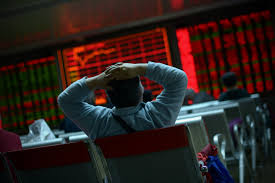Stocks Indexes Fell on the Fed’s View on the Economy. Here’s Why

U.S. stocks closed off their early highs Thursday after the Federal Reserve issued a bullish view on the economy, while sounding a note of caution about a potential slowdown in business spending.
The S&P 500 Index closed down 7.06 points, or 0.3%, at 2,806.83 Thursday after rising as high as 2,814.75. The Dow Jones Industrial Average was unchanged, while the tech-heavy Nasdaq Composite closed down 0.5% at 7,530.88. The three indexes spent much of Thursday in positive territory before the Fed’s assessment.
“Information received since the Federal Open Market Committee met in September indicates that the labor market has continued to strengthen and that economic activity has been rising at a strong rate,” the Federal Reserve said in a monthly statement that is closely parsed by economists and investors.
An analysis by the Wall Street Journal of the Fed’s statement showed that the Fed replaced last month’s language about growth in both household and business spending with a sentence that read, “Household spending has continued to grow strongly, while growth of business fixed investment has moderated from its rapid pace earlier in the year.”
Such a minor change can seem arcane, but to Wall Street it may signal a shift in the Fed’s policy on interest rates, which has been accommodating enough to higher interest rates to incur the vocal disapproval of President Trump. Late last month, Trump ramped up his criticism of Fed Chairman Jerome Powell’s inclination to keep lifting interest rates.
The Fed’s statement indicated it would hold interest rates steady, but its mention of the moderation of the pace in business investment may presage a slowdown in overall economic growth. So far in 2018, the Fed’s concerns about the U.S. economy has centered more on limiting the potential threat of inflation, which along with job creation is one of the agency’s two mandates.
The vacillation in stock indexes in recent weeks reflects the market’s uncertainty among investors about the outlook for the U.S. economy. Higher interest rates can make equities less attractive investments. On the other hand, a slower economy can hamper the ability of companies to maintain profit growth. The combination of economic growth and low interest rates is positive for stock prices, so any change in that mix can add to investor uncertainty.








